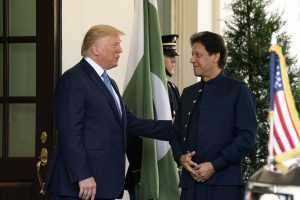Pakistan is buzzing with speculation over the likely position that U.S. President-elect Donald Trump, who is set to take office on January 20, could take vis-à-vis imprisoned former Pakistani Prime Minister Imran Khan.
A section of Pakistan, particularly workers of Khan’s Pakistan Tehreek-e-Insaf (PTI), believe that Trump may intervene to secure Khan’s release. This speculation is also prevalent among social media channels and overseas supporters of the party, especially those living in the United States who have been lobbying for their imprisoned leader. They hope to persuade the U.S. government to pressure Pakistani authorities to release Khan from prison.
In 2023, a court sentenced Khan to three years in jail for illegally selling state gifts. In addition, the former Pakistani prime minister faces anti-terrorism charges related to the violence following his arrest in May 2023.
The PTI’s leadership abroad is optimistic. They point out that there was exceptional camaraderie between Trump during his first term in office and Khan; the two leaders connected on a personal level. They argue that this rapport could prompt Trump to engage actively in efforts to get Khan freed from prison.
The speculation has gained momentum with Trump’s newly appointed envoy for special missions, Richard Grenell, expressing support for the imprisoned PTI leader. Grenell tweeted “Release Imran Khan” on November 26, coinciding with a clampdown by authorities on PTI protesters marching toward Islamabad’s D-Chowk.
In a recent statement, Grenell, a controversial figure known for making offensive and bizarre remarks, asserted that the United States had a stronger relationship with Pakistan during the Trump administration, particularly during Khan’s leadership.
These comments have gained traction, fueled by fake AI-generated images circulating on social media that depict Trump holding banners advocating for Khan’s release.
These developments seem to have unsettled government officials in Pakistan.
Talal Chaudhry, a senator of the ruling Pakistan Muslim League-Nawaz, responded to Grenell’s remarks by stating that the government’s position is “very clear: this is our internal matter.” He dismissed any possibility of Khan being released based on such statements, insisting that Imran Khan is facing charges of corruption and constitutional violations.
Similarly, Pakistani Defense Minister Khawaja Asif downplayed Grenell’s recent posts in support of Khan, emphasizing that the government did not expect the remarks to have any repercussions once Trump took office on January 20.
“I don’t think there is any pressure involved,” Asif stated in an interview when asked about potential U.S. pressure regarding Khan’s release after Grenell’s appointment.
“In American politics, there are different considerations that different people and parties have and according to that they express their views, but as far as government to government relations go, their expression or interpretation through any tweets, or such statements, is far-fetched … I don’t think there will be any repercussions of [Grenell’s tweets] at any level,” Asif continued.
While the PTI may hope and lobby for U.S. intervention behind the scenes to secure their leader’s release, the history of Pakistan-U.S. relations indicates that such interventions rarely occur or succeed for various reasons.
For one thing, the warm personal equation between Trump and Khan notwithstanding, relations between the United States and Pakistan largely lacked substance during their tenures at the helm.
Initially, ties were strained when Trump announced a halt to U.S. assistance for Pakistan, including the Coalition Support Funds. For more than half of Trump’s term, there was no U.S. ambassador in Islamabad. However, after Trump decided to withdraw troops from Afghanistan, relations improved as Washington sought Pakistan’s assistance to facilitate talks with the Taliban and to reach an agreement in Doha.
In addition, the relationship between the U.S. and Pakistan militaries has often helped mitigate pressures that political leaders in Washington might exert, even during times of strained diplomatic ties. Pakistan’s relationship with the U.S. is also deeply embedded in the bureaucratic and defense institutions of the U.S., making it resilient to shifts in political sentiment or lobbying from activists of any party.
Trump has threatened to impose high tariffs on a range of countries, including China, India, and the United States’ European allies. This could have negative implications for the U.S. economy, triggering challenges for Trump 2.0.
Consequently, it seems unlikely that he will have the time or inclination to invest in supporting Khan, especially given the minimal U.S. interest in Pakistan at present.
It is also puzzling why the United States would consider supporting a leader who has previously built his political narrative and gained popularity by criticizing Washington for its perceived role in his ouster in 2022. In fact, Khan’s narrative may have contributed to the growing unpopularity of the U.S. in Pakistan.
Furthermore, it would be irrational for the U.S. to compromise its relationship with the Pakistani state, particularly the military – an ally with a proven track record – to back a politically volatile and unpredictable figure like Khan.
The U.S. State Department has made it clear that decisions regarding legal action against Pakistan’s former prime minister will be determined by Pakistani courts. A spokesperson stated, “We do not comment on Congressional correspondence… legal proceedings against the former prime minister are matters for the Pakistani courts to decide.”
While PTI supporters may speculate about a potential Trump intervention for Imran Khan’s release, such negotiations between the U.S. and Pakistan, or an official position reflecting that, are very unlikely.

































